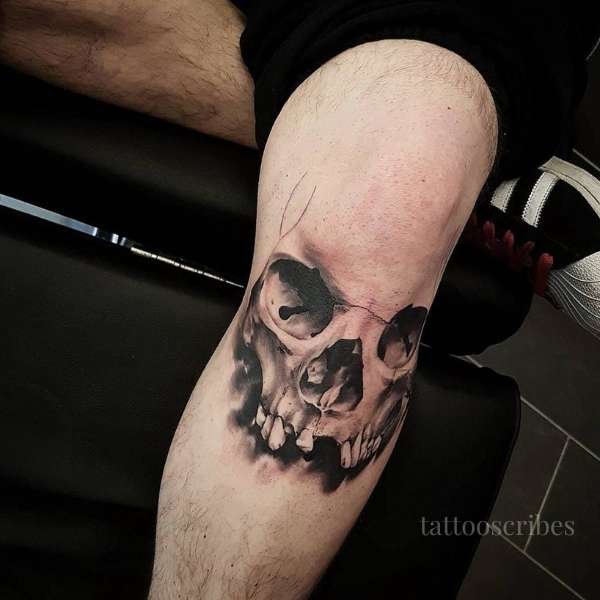A skull tattoo is one of the most popular, loved for its bold design and deep symbolism. It’s not just a simple symbol; it represents strength, mortality, and transformation.
This meaningful tattoo can carry a unique interpretation, depending on the colors and placement.
Whether it’s your first tattoo or you’re adding to your collection, the tattoo symbolism behind it offers much to explore. Keep reading to learn about the powerful meanings and design options.

What Does a Skull Tattoo Mean?
A skull tattoo meaning represents the acceptance of life’s impermanence. It’s not just about death — it’s about courage, rebirth, and honoring the journey of existence. Many see it as a symbol of inner strength and survival.
General Symbolism of Skull Tattoos
- Mortality – Reminds you that life is short and precious.
- Rebirth – Symbolizes new beginnings after hardship.
- Courage – Represents fearlessness in the face of challenges.
- Wisdom – Reflects lessons learned through life and loss.
- Protection – A spiritual guard against negativity or evil.
- Freedom – Marks liberation from old habits or past struggles.
You may also like below posts:

Cultural Meanings of Skull Tattoos
- Mexican Culture – Sugar skulls (Calaveras) honor lost loved ones during Día de los Muertos.
- Celtic Tradition – Represents the soul’s immortality and the cycle of life and death.
- Japanese Culture – Seen as a symbol of impermanence and the beauty of change.
- Western Symbolism – Often used to portray rebellion, toughness, or anti-authority spirit.
- Eastern Beliefs – Signifies detachment from the material world and spiritual awakening.
Skull Tattoo Variations and Designs
- Sugar Skull Tattoo – Honors the dead and celebrates life.
- Floral Skull Tattoo – Combines beauty and decay, symbolizing balance.
- Animal Skull Tattoo – Represents instincts, strength, and primal nature.
- Half-Face Skull Tattoo – Blends life and death, showing transformation.
- Geometric Skull Tattoo – Adds modern minimalism to deep symbolism.

Color Variations of Skull Tattoo
- Black & Gray – Classic look for mortality and realism.
- Red – Power, danger, and passion.
- Blue or Purple – Spiritual depth and calm energy.
Other Symbolic Meanings of Skull Tattoos
- Personal Growth – Marks a time of overcoming hardship.
- Transformation – Embracing change and letting go of the past.
- Strength – Proof of surviving dark times.
- Balance – Recognizing light and darkness in life.
- Mystery – Represents curiosity about life beyond the physical world.
Learn more about selecting the right artist here.

Meaningful Placement Ideas
- Forearm – Courage and openness to life’s truths.
- Chest – Protection of heart and soul.
- Back – Strength carried through life’s burdens.
- Neck – Facing fear directly, showing resilience.
- Legs – Walking through transformation and change.
Read more about tattoo aftercare here.
Other Skull Tattoo Variations

Skull Tattoo with Wings Meaning
A skull tattoo with wings symbolises freedom, transformation, and letting go of the past. The skull represents mortality and life’s challenges, while wings add a sense of escape, hope, and new beginnings. Together, this design embodies strength, personal growth, and the courage to overcome obstacles.
Skull Tattoo with Crown Meaning
A skull tattoo with a crown symbolises power, triumph, and embracing life’s challenges. The skull reminds us of mortality and resilience, while the crown adds authority, victory, and confidence. Together, this tattoo represents strength, overcoming obstacles, and embracing your personal power boldly and strikingly.
Skull and Rose Tattoo Meaning
A skull and rose tattoo meaning blends life and death, love and mortality. The skull symbolizes strength, transformation, and overcoming challenges, while the rose adds beauty, passion, and hope. Together, this design embodies the balance between darkness and light, making it a powerful tattoo that celebrates resilience and the impermanence of life.
Skull and Snake Tattoo Meaning
A skull and snake tattoo blends life, death, and transformation. The skull represents mortality and endings, while the snake symbolizes rebirth, healing, and hidden wisdom. Together, this design reflects overcoming challenges, embracing change, and the cycle of life, making it a powerful tattoo full of personal strength and deeper meaning.
Skull Moth Tattoo Meaning
A Skull Moth tattoo means mystery, transformation, and the balance between life and death. The skull represents mortality, while the moth symbolizes change, intuition, and resilience. Together, it’s a striking design that reflects personal growth, embracing life’s cycles, and finding strength even in the darkest or most challenging times.
Skull Butterfly Tattoo Meaning
A skull butterfly tattoo blends transformation with life’s fragility. The skull represents mortality and strength, while the butterfly symbolizes change, rebirth, and freedom. Together, this tattoo symbolises embracing life’s challenges, fostering personal growth, and celebrating the beauty of transformation, making it a powerful and meaningful design for anyone seeking depth and symbolism.
Skull and Crossbones Tattoo Meaning
A skull and crossbones tattoo meaning is all about danger, rebellion, and a fearless attitude. Traditionally linked to pirates and warning signs, it also symbolises mortality and the pursuit of living boldly. Wearing this design shows strength, courage, and a “live life on your terms” mindset, making it a striking and edgy tattoo choice.
Bull Skull Tattoo Meaning
A Bull Skull Tattoo symbolizes strength, resilience, and protection. Often associated with the American West and Native American culture, it represents overcoming challenges and embracing life’s hardships. This bold design also conveys courage and a grounded spirit, making it a powerful choice for anyone who wants to showcase inner strength and determination.
Sugar Skull Tattoo Meaning
A Sugar Skull tattoo celebrates life, remembrance, and cultural heritage. Inspired by Día de los Muertos traditions, it honours loved ones who have passed while embracing joy and colour in life. This tattoo seamlessly blends vibrant artistry with personal storytelling, making it a meaningful tribute that is full of life, memory, and spirit.
Ram Skull Tattoo Meaning
A ram skull tattoo represents strength, determination, and resilience. Rams are known for their courage and boldness, and the skull adds a touch of mortality and power. This tattoo symbolises facing challenges head-on, embracing inner strength, and honouring the cycle of life with confidence and grit.
Deer Skull Tattoo Meaning
A deer skull tattoo blends strength, transformation, and respect for nature. It symbolizes the cycle of life, resilience, and personal growth, while also reflecting a connection to the wild. This design exudes a bold, edgy vibe, making it perfect for individuals who embrace change and celebrate their inner strength.
Butterfly Skull Tattoo Meaning
A butterfly skull tattoo blends transformation and mortality in a striking design. The butterfly symbolizes change, rebirth, and freedom, while the skull represents life’s impermanence and inner strength. Together, this tattoo embodies the balance between growth and endings, making it a bold and meaningful choice for personal expression.
Goat Skull Tattoo Meaning
A goat skull tattoo represents strength, resilience, and transformation. Often linked to overcoming challenges, it can also symbolise wisdom and the cyclical nature of life and death. This bold design exudes a powerful, edgy vibe, making it perfect for anyone seeking to showcase courage, inner strength, and a fearless approach to life.
Cow Skull Tattoo Meaning
A cow skull tattoo symbolizes strength, resilience, and protection. Often linked to the American West and Native American culture, it represents survival through harsh conditions and respect for life’s cycles. This tattoo can also reflect grounding, endurance, and a bold, fearless spirit, making it a striking and meaningful design.
Longhorn Skull Tattoo Meaning
A longhorn skull tattoo symbolizes strength, resilience, and courage. Often linked to the rugged spirit of the American West, it represents overcoming challenges and staying tough in life’s struggles. This bold design also reflects protection, power, and a fearless attitude, making it a striking choice for those who embrace inner strength.
Raven Skull Tattoo Meaning
A Raven Skull tattoo blends mystery, transformation, and wisdom. Ravens are known as clever, mystical birds, while the skull adds a reminder of mortality and change. Together, these tattoos symbolise embracing life’s cycles, personal growth, and inner strength, making it a bold choice for those drawn to powerful, thought-provoking designs.
Frequently Asked Questions About Skull Tattoos
Are skull tattoos only about death?
No, they often represent life, rebirth, and transformation, not just mortality.
Is a skull tattoo bad luck?
Not at all — in many cultures, it’s a charm for protection and strength.
What does a sugar skull tattoo mean?
It celebrates loved ones who passed away and honors their spirit.
Can women get skull tattoos?
Yes, they’re equally popular for expressing resilience, elegance, and depth.
What’s the best color for a skull tattoo?
Black and gray for realism; colorful designs for symbolic or cultural meaning.
Do skull tattoos have spiritual meaning?
Yes, they often represent the cycle of rebirth and spiritual awakening.
Final thought
Skull tattoos have deep cultural significance and personal meaning, offering a unique way to express individuality, strength, and resilience.
Whether honoring loved ones or embracing life’s impermanence, these tattoos continue to evolve in design and meaning, making them a timeless choice for many.
